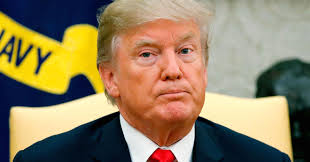Trump says he is willing to talk with Robert Mueller in investigation into Russian interference in 2016 election
Donald Trump said late Wednesday that he would be willing to speak to the special counsel office’s under oath, adding that he was “looking forward” to talking with Robert Mueller, who is investigating Russian interference in the 2016 election, including alleged contacts with the Trump campaign.
Speaking with reporters at the White House before he set out for the World Economic Forum in Davos, Switzerland, Trump was asked about a potential interview with Mueller.
“I’m looking forward to it,” he answered. “I would love to do it.”
He added that the interview could occur in “two or three weeks”.
Trump’s statement would seem to end months of speculation about whether the special counsel would interview the president, though he also said he would testify under oath last year. The president’s attorneys have met with their counterparts in the special counsel’s office.
Mueller’s team is tasked with investigating Russian meddling in the election, including hacks of Democratic party emails and contacts between members of Trump’s campaign and Russians. The special counsel’s office has charged Trump’s former campaign manager Paul Manafort with money laundering and conspiracy, and his former national security adviser Michael Flynn and one of his former foreign policy advisers, George Papadopoulos, have each pleaded guilty to lying to the FBI about their contacts with Russians.
The special counsel’s office is also investigating potential obstruction of justice, and has questioned the attorney general, Jeff Sessions, in part to discuss the president’s decision to fire James Comey as FBI director.
Also on Wednesday, Trump rejected criticism of his attacks on the Russia inquiry. “You fight back, oh, it’s obstruction,” Trump said.
He added: “We’re going to find out” if he gets a fair shake from Robert Mueller.
“There’s been no collusion whatsoever,” Trump said. “There’s no obstruction whatsoever.”
The timing and circumstances of a Trump interview are still being ironed out. That conversation will be dominated by questions tied to whether he took steps to thwart an FBI investigation.
So far, witness interviews and the special counsel’s document requests make clear Mueller has a keen interest in Comey’s 9 May firing and the contents of Comey’s private conversations with the president, as well as Flynn’s ousting months earlier and the weeks of conversations leading up to it.
Recent interviews with administration officials, including Sessions, have shown that Trump is dealing with prosecutors who already have amassed a wealth of knowledge about the events he’ll be questioned about.
Sessions, who had urged Comey’s firing, was interviewed for hours, becoming the highest-ranking Trump administration official known to have submitted to questioning. Mueller also wants to interview former adviser Steve Bannon, who has called Comey’s firing perhaps the biggest mistake in “modern political history”.
The White House initially said the firing was based on the justice department’s recommendation and cited as justification a memo that faulted Comey’s handling of the Hillary Clinton email investigation. But Trump himself said later he was thinking of this “Russia thing” and had intended to fire Comey anyway.
Mueller has been investigating the events leading up to Flynn’s dismissal from the White House, including how officials responded to information from the former acting attorney general Sally Yates that Flynn had misled them by saying that he had not discussed sanctions. Despite that warning, and despite an FBI interview days after Trump’s inauguration, Flynn was not forced to resign until 13 February, the night of media reports about Yates’ conversation with McGahn.
Mueller will probably want to know what Trump understood, before asking Comey to let the Flynn investigation go, about Flynn’s interview with the FBI and whether he had made false statements about his conversation with the Russian ambassador.
The Guardian
 Lebanese Ministry of Information
Lebanese Ministry of Information



